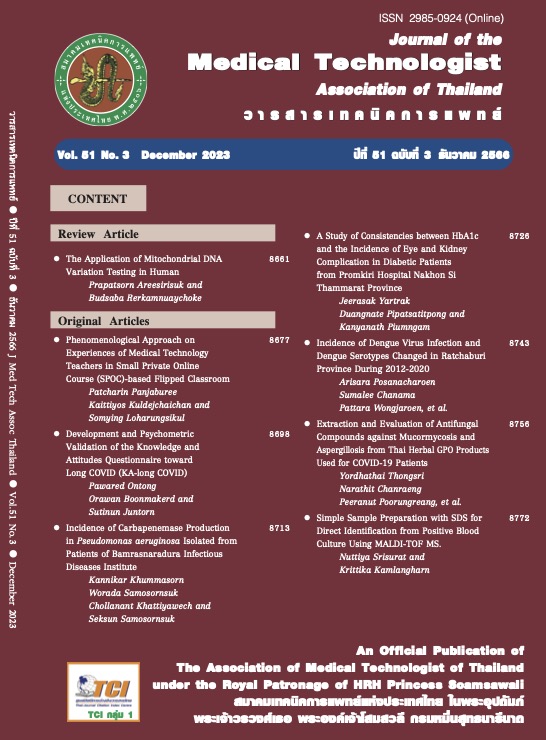การพัฒนาและตรวจสอบคุณภาพเชิงจิตวิทยาของแบบสอบถาม ความรู้และทัศนคติที่มีต่อภาวะลองโควิด
คำสำคัญ:
ลองโควิด, แบบสอบถาม, ความรอบรู้ด้านสุขภาพ, นักเทคนิคการแพทย์ชุมชนบทคัดย่อ
ปัจจุบันผลกระทบของภาวะลองโควิดเพิ่มขึ้นทั่วโลก อาการของลองโควิดมีความหลากหลาย และกลไกทางพยาธิสรีรวิทยายังไม่เป็นที่เข้าใจดีนัก ดังนั้นการประเมินความรู้ และทัศนคติของบุคคลที่มีต่อภาวะลองโควิดจึงเป็นสิ่งสำคัญ จุดมุ่งหมายของงานวิจัยนี้คือการสร้างและตรวจสอบแบบสอบถามประเมินความรู้ และทัศนคติที่มีต่อภาวะลองโควิด ประกอบด้วย ส่วนความรู้ 14 ข้อ และทัศนคติ 6 ข้อ ซึ่งได้รับการตรวจสอบความตรงเชิงเนื้อหาของแบบสอบถามโดยผู้เชี่ยวชาญ จากนั้นคัดเลือกผู้เข้าร่วมวิจัยที่มีสุขภาพดี อายุระหว่าง 18-60 ปี จำนวน 30 คน เพื่อประเมินความสอดคล้องภายใน และความเที่ยงภายในผู้ประเมิน ผลการวิจัยพบว่าดัชนีความตรงเชิงเนื้อหารายข้อ (I-CVI) และดัชนีความตรงเชิงเนื้อหาทั้งฉบับ (S-CVI) เป็นที่ยอมรับ (≥0.8 และ 0.91 ตามลำดับ) ความสอดคล้องภายในส่วนทัศนคติของแบบสอบถามอยู่ในระดับดี (Cronbach's alpha = 0.82) และความเที่ยงภายในผู้ประเมินส่วนความรู้อยู่ในเกณฑ์ยอมรับได้ (percent agreement≥ 66.7) เช่นเดียวกับส่วนทัศนคติที่แสดงด้วยสัมประสิทธิ์สหสัมพันธ์ซึ่งมีนัยสำคัญทางสถิติ (p<0.05) โดยสรุปแล้วแบบประเมินความรู้ และทัศนคติที่มีต่อภาวะลองโควิดเป็นเครื่องมือที่มีความเป็นมาตรฐาน ซึ่งจะสามารถนำไปใช้เป็นแนวทางแก่บุคลากรทางการแพทย์ นักเทคนิคการแพทย์ชุมชน ในการประเมินความรอบรู้ด้านสุขภาพ รวมถึงใช้เป็นแนวทางสำหรับส่งเสริมสุขภาพในชุมชนเอกสารอ้างอิง
Liu YC, Kuo RL, Shih SR. COVID-19: The first documented coronavirus pandemic in history. Biomed J 2020; 43: 328-33.
Tay MZ, Poh CM, Renia L, MacAry PA, Ng LFP. The trinity of COVID-19: immunity, inflammation and intervention. Nat Rev Immunol 2020; 20: 363-74.
Mehandru S, Merad M. Pathological sequelae of long-haul COVID. Nat Immunol 2022; 23: 194-202.
Silva Andrade B, Siqueira S, de Assis Soares WR, et al. Long-COVID and Post-COVID Health Complications: An up-to-date review on clinical conditions and their possible molecular mechanisms. Viruses 2021; 13.
Nalbandian A, Sehgal K, Gupta A, et al. Post-acute COVID-19 syndrome. Nat Med 2021; 27: 601-15.
Castanares-Zapatero D, Chalon P, Kohn L, et al. Pathophysiology and mechanism of long COVID: a comprehensive review. Ann Med 2022; 54: 1473-87.
Lopez-Leon S, Wegman-Ostrosky T, Perelman C, et al. More than 50 long-term effects of COVID-19: a systematic review and meta-analysis. Sci Rep 2021; 11: 16144.
Aiyegbusi OL, Hughes SE, Turner G, et al. Symptoms, complications and management of long COVID: a review. J R Soc Med 2021; 114: 428-42.
Davis HE, McCorkell L, Vogel JM, Topol EJ. Long COVID: major findings, mechanisms and recommendations. Nat Rev Microbiol 2023; 21: 133-46.
O’Mahoney LL, Routen A, Gillies C, et al. The prevalence and long-term health effects of Long Covid among hospitalised and non-hospitalised populations: A systematic review and meta-analysis. EClinicalMedicine 2023; 55: 101762.
L OM, Buwalda T, Blair M, et al. Impact of Long COVID on health and quality of life. HRB Open Res 2022; 5: 31.
Malik P, Patel K, Pinto C, et al. Post-acute COVID-19 syndrome (PCS) and health-related quality of life (HRQoL)-A systematic review and meta-analysis. J Med Virol 2022; 94: 253-62.
Ishikawa H, Kato M. Health literacy and COVID-19-related beliefs and behaviors: a longitudinal study of the Japanese general population. Health Promot Int 2023; 38.
Siri Y, Arthan A, Nirachon C. Health literacy and preventive behaviors on COVID-19 among undergraduate students in a University of Southern Thailand. Dis Control J 2022; 48: 493-504.
Danpradit P, Jermtienchai K. Relationship between health literacy and COVID-19 prevention behaviors of COVID-19 infected people during the pandemic in 2021 and the First trimester of 2022. Vajira Nursing Journal 2022; 24: 70-84.
Naveed MA, Shaukat R. Health literacy predicts Covid-19 awareness and protec- tive behaviours of university students. Health Info Libr J 2022; 39: 46-58.
Nutbeam D. Health literacy as a public health goal: a challenge for contemporary health education and communication strategies into the 21st century. Health Promotion International. 2000. p. 259-67.
Nutbeam D. The evolving concept of health literacy. Soc Sci Med 2008; 67: 2072-8.
Polit DF, Beck CT. The content validity index: are you sure you know what’s being reported? Critique and recommendations. Res Nurs Health 2006; 29: 489-97.
Polit DF, Beck CT, Owen SV. Is the CVI an acceptable indicator of content validity? Appraisal and recommendations. Res Nurs Health 2007; 30: 459-67.
Mukaka MM. Statistics corner: A guide to appropriate use of correlation coefficient in medical research. Malawi Med J 2012; 24: 69-71.
Schober P, Boer C, Schwarte LA. Correlation coefficients: Appropriate use and interpretation. Anesth Analg 2018; 126: 1763-8.
Raman B, Bluemke DA, Luscher TF, Neubauer S. Long COVID: post-acute sequelae of COVID-19 with a cardiovas- cular focus. Eur Heart J 2022; 43: 1157-72.
Bucciarelli V, Nasi M, Bianco F, et al. Depression pandemic and cardiovascular risk in the COVID-19 era and long COVID syndrome: Gender makes a difference. Trends Cardiovasc Med 2022; 32: 12-7.
Jimeno-Almazan A, Pallares JG, Buendia-Romero A, et al. Post-COVID-19 syndrome and the potential benefits of exercise. Int J Environ Res Public Health 2021; 18.
ดาวน์โหลด
เผยแพร่แล้ว
รูปแบบการอ้างอิง
ฉบับ
ประเภทบทความ
สัญญาอนุญาต
ลิขสิทธิ์ (c) 2023 วารสารเทคนิคการแพทย์

อนุญาตภายใต้เงื่อนไข Creative Commons Attribution-NonCommercial-NoDerivatives 4.0 International License.






